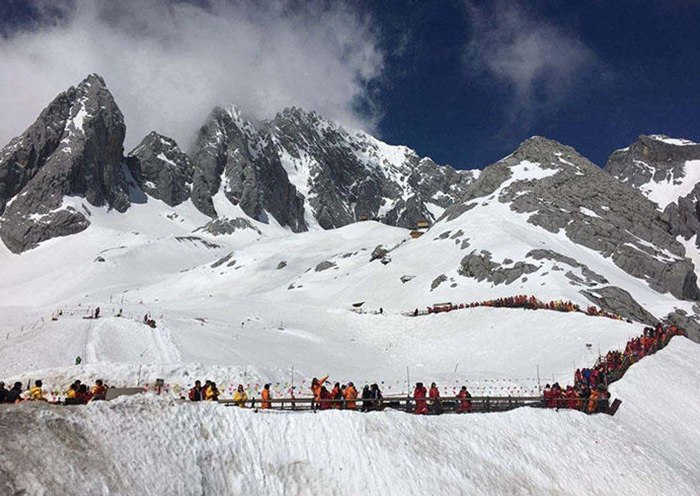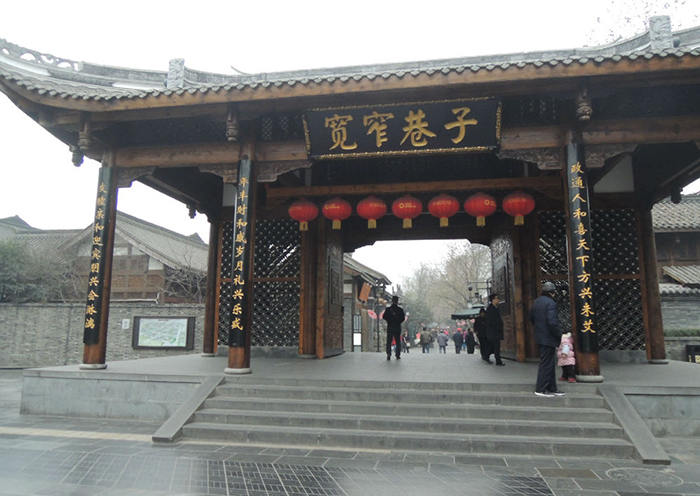After an enjoyable day exploring the ancient village, we will take you to your hotel to check in for the night.
Accommodation:Overnight in Lijiang
After checking out Jade Dragon Snow Mountain, we will move on to the beautiful Black Dragon Pool located in the picturesque Jade Spring Park, which was built in 1737. Here we can stroll along the cobblestone paths for a striking view of Jade Dragon Snow Mountain over the pool’s white marble bridge and visit the Moon Embracing Pavilion. If time allows and you have any interest, we can also visit the Dongba Culture Museum inside the park.
After visiting Black Dragon Pool, we will take you back to your accommodations in Lijiang Ancient Town where you will have the evening to rest and relax or explore around the beautiful village on your own. The old village is beautifully lit up at night, so a stroll around the area makes for a perfect ending to your time in Yunnan.
Accommodation:Overnight in Lijiang
Accommodation:Overnight in Chengdu
After meeting the pandas, we will take you back to downtown Chengdu to visit Old Jinli Street for a stroll on the lively streets full of delicious local snacks, traditional handicrafts, folk shows and much more. We can then visit the nearby Wuhou Temple, which is an ancient shrine dedicated to Zhuge Liang, the Marquis of Wu of the Kingdom of Shu during the Three Kingdoms period of China (220 – 280 A.D.) The shrine was originally established in 221 A.D. as a tomb for Shu Emperor Liu Bei, but the current temple was rebuilt in 1672 as it had evolved into a memorial for other rulers as well. One of the highlights of the temple is the 1,210-year old “Three Success Stele” that was erected in 809 A.D.
After visiting the Wuhou Temple, we will transfer you to the Chengdu train station and help you get on board your train to Lhasa, which departs at 21:37 (9:37 p.m.). This train will travel 3,600 kilometers through southwestern China via Lanzhou and Xining, then crossing over the Qinghai – Tibet Plateau and arriving in Lhasa at 09:55 the morning of the third day. Although it is a long journey, you will be able to see and experience much that most normal travelers never have the opportunity to do as you travel along the world’s highest railway while enjoying the endless snow-capped mountain scenery and rare wild life right outside of your train’s windows.
Today’s trip notes:
1) It’s best to arrive at the Chengdu train station at least 45 minutes before your train’s scheduled departure time, so we will have you there around 20:50 (8:50 p.m.) Ticket and Tibet Entry Permit check to board the the train starts about 30 minutes before the train departs.
2) It is a good idea to take some food, snacks and drinks for the long train journey.
Accommodation:Overnight on the train
Today’s trip notes:
1) There is access to outlets for battery charging on board the train, but you will want to make sure that you have a proper socket adapter;
2) Only Chinese-style food is available on board the train, including breakfast, boxed lunches and self-selected meals in the dining car.
Accommodation:Overnight on the train
After arriving at the Lhasa Railway Station at around 9:55 a.m., your local tour guide will greet you to escort you by private car to your hotel in Lhasa. The rest of the day will be free for you to explore the local area and acclimatize yourself to the air, temperature and high altitude of Lhasa.
Tips for High Altitude Acclimatization:
1) Go for a leisurely walk in the fresh high altitude air, but avoid any strenuous activity after your arrival.
2) It's better to avoid taking a bath to avoid catching a cold.
3) Drink plenty of water to avoid dehydration, and eat some fresh fruit.
4) Get plenty of rest.
Accommodation:Overnight in Lhasa
From one historic landmark to another, your next stop will be at the Jokhang Temple, considered as the spiritual heart of Tibetan Buddhism. Every day thousands of pilgrims come from all over Tibet and other places to the temple to worship the Buddha. The Jokhang Temple is also known as the "House of Buddha" because it houses the precious Jowo Rinpoche, a life-sized (1.5 meter/5 feet) image of the Sakyamuni at the age of 12.
The last stop for today's Lhasa exploration is Barkhor Street, the wide, circular street that surrounds the Jokhang Temple. Local residents enjoy walking on the street, completing several circuits around the temple as a daily tradition of pilgrimage. The street also has many small shops selling a wide variety of traditional Tibetan goods, religious items and handicrafts.
After your visit to the Jokhang Temple, we will take you back to your hotel for the evening.
Tips for Visiting the Potala Palace
1. The number of visitors to the palace is strictly limited to 2,300 per day. Visitors can only visit during the time specified on the admission ticket.
2. Admission tickets to visit the Potala Palace are sold out almost every day, so it is strongly recommended to book your tickets several days in advance.
3. There are many steps at the Potala Palace, so it’s best to take it slowly to avoid possible altitude discomfort.
4. Visitors should respect the rules while visiting. Do not wear hats, wear revealing clothes or step on thresholds as these actions violate local customs.
5. Photography and the taking of videos are forbidden inside the Potala Palace.
6. A security search will take place at the entrance to the palace. Explosives, flammables, knives, lighters and even water bottles are not allowed inside the Potala Palace.
Accommodation:Overnight in Lhasa
After visiting the palaces and park at Norbulingka, we will travel around 5 kilometers to the western outskirts of Lhasa to visit the Drepung Monastery. The word "drepung" in Tibetan language means "prosperity". Since its establishment in 1416, Drepung Monastery has served as one of the most important Buddhist monasteries in Tibet. During its prime, more than 10,000 monks lived and studied in the monastery. Throughout its history, many important and famous Tibetan leaders studied at this monastery, including the Dalai Lamas. Accordingly, Drepung Monastery is also respectfully known as the “Mother School of Dalai Lamas”.
In the afternoon, we will escort you on to another famous monastery in Lhasa - the Sera Monastery. Sera Monastery is famous for its spectacular “Buddhist Debates”. As a daily routine, the monks gather in a courtyard, and debate on the various Buddhist doctrines with exaggerated gestures, which is thought to be helpful in facilitating a better comprehension of the Buddhist philosophy to attain higher levels of study. After enjoying the "Buddhist Debates", we will take you back to your hotel with the rest of the day and evening to relax or explore on your own.
Tips for Proper Etiquette While Visiting Monasteries
1) For clothing, shorts and/or bare shoulders are not allowed.
2) Hats and sunglasses should be removed before entering the chapels.
3) Taking photos is usually not allowed inside the chapels.
Accommodation:Overnight in Lhasa
Accommodation:Overnight at Local Hotel in Dangxiong
After an enjoyable day exploring the ancient village, we will take you to your hotel to check in for the night.
Accommodation:Overnight in Lhasa
Today's Tips:
1) Please take care to pack all of your belongings, particularly the small things that are easy to forget about, such as phone and camera chargers, power adapters, mobile phones, wallets, etc.
2) If your flight or train is in the afternoon, please be sure to check out of your hotel room by 12 p.m.
Accommodation:None















































 Data in submission...
Data in submission...